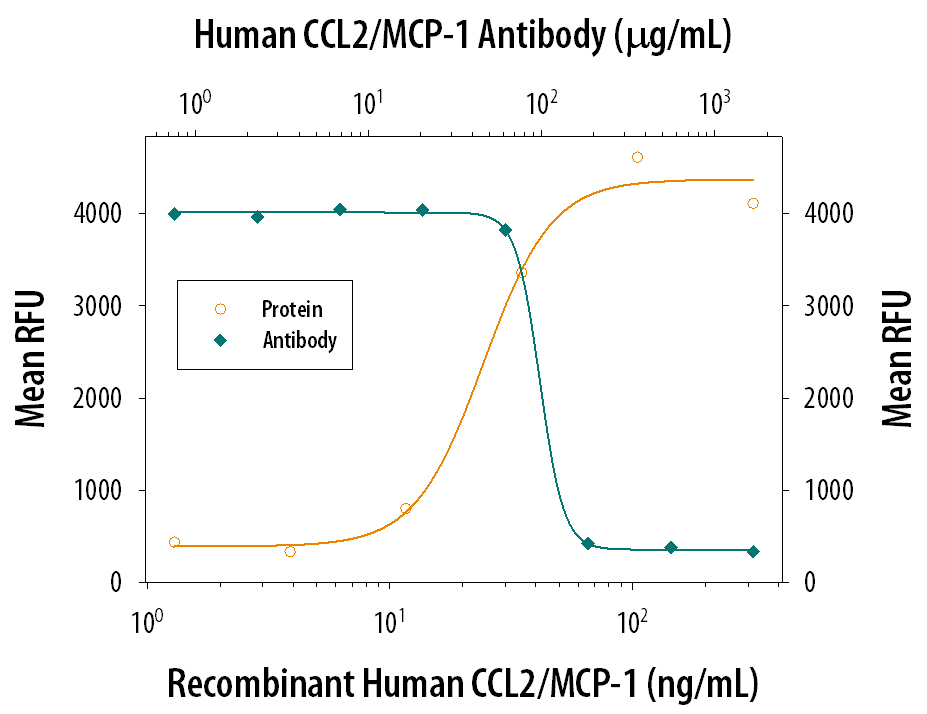Human CCL2/JE/MCP-1 Antibody Summary
Gln24-Thr99
Accession # P13500
Applications
Please Note: Optimal dilutions should be determined by each laboratory for each application. General Protocols are available in the Technical Information section on our website.
Scientific Data
 View Larger
View Larger
Chemotaxis Induced by CCL2/MCP‑1 and Neutral-ization by Human CCL2/ MCP‑1 Antibody. Recombinant Human CCL2/ MCP-1 (Catalog # 279-MC) chemoattracts BaF3 mouse pro-B cell line transfected with human CCR2A in a dose-dependent manner (orange line). The amount of cells that migrated through to the lower chemotaxis chamber was measured by Resazurin (Catalog # AR002). Chemotaxis elicited by Recombinant Human CCL2/ MCP-1 (0.1 µg/mL) is neutralized (green line) by increasing concentrations of Goat Anti-Human CCL2/MCP-1 Polyclonal Antibody (Catalog # AB-279-NA). The ND50 is typically 50-100 µg/mL.
Reconstitution Calculator
Preparation and Storage
- 12 months from date of receipt, -20 to -70 °C as supplied.
- 1 month, 2 to 8 °C under sterile conditions after reconstitution.
- 6 months, -20 to -70 °C under sterile conditions after reconstitution.
Background: CCL2/JE/MCP-1
CCL2, also called monocyte chemotactic protein-1 (MCP-1) or JE, is a member of the C-C or beta chemokine family that is best known as a chemotactic agent for mononuclear cells (1, 2). Human CCL2 cDNA encodes a 99 amino acid (aa) precursor protein with a 23 aa signal peptide and a 76 aa mature protein (2). Removal of the first 5 aa of the mature protein, including the N-terminal pyrrolidone carboxylic acid-modified glutamine, occurs naturally by metalloproteinase cleavage and downregulates activity but not receptor binding (3). CCL2 may form multiple bands from 8.7‑13.5 kDa on SDS-PAGE due to non-covalent dimerization and variable carbohydrate content (3). Mature human CCL2 shares 78 - 79% aa identity with canine, porcine and equine CCL2, while mouse and rat express a form of CCL2 that is extended by 49 aa and shares only ~56% aa identity within the common region. Human CCL2 can, however, induce a response in murine cells (4). Fibroblasts, glioma cells, smooth muscle cells, endothelial cells, lymphocytes and mononuclear phagocytes can produce CCL2 either constitutively or upon mitogenic stimulation, but monocytes and macrophages appear to be the major source (1, 2). In addition to its chemotactic activity, CCL2 induces enzyme and cytokine release by monocytes, NK cells and lymphocytes, and histamine release by basophils that express its receptor, CCR2 (2). Additionally, it promotes Th2 polarization in CD4+ T cells (5). CCL2-mediated recruitment of monocytes to sites of inflammation is proposed to play a role in the pathology of atherosclerosis, multiple sclerosis and allergic asthma (6, 7).
- Yoshimura, T. et al. (1989) FEBS Lett. 244:487.
- Deshmane, S.L. et al. (2009) J. Interferon Cytokine Res. 29:313.
- Proost, P. et al. (1998) J. Immunol. 160:4034.
- Van Riper, G. et al. (1993) J. Exp. Med. 177:851.
- Luther, S.A. and J.G. Cyster (2001) Nat. Immunol. 2:102.
- Daly, C. et al. (2003) Microcirculation 10:247.
- Aukrust, P. et al. (2008) Arterioscler. Thromb. Vasc. Biol. 28:1909.
Product Datasheets
Citations for Human CCL2/JE/MCP-1 Antibody
R&D Systems personnel manually curate a database that contains references using R&D Systems products. The data collected includes not only links to publications in PubMed, but also provides information about sample types, species, and experimental conditions.
3
Citations: Showing 1 - 3
Filter your results:
Filter by:
-
Bone marrow stromal cells derived MCP-1 reverses the inhibitory effects of multiple myeloma cells on osteoclastogenesis by upregulating the RANK expression.
Authors: Liu Z, Xu J, Li H, Zheng Y, He J, Liu H, Zhong Y, Lu Y, Hong B, Zhang M, Lin P, Du J, Hou J, Qian J, Kwak L, Yi Q, Yang J
PLoS ONE, 2013-12-10;8(12):e82453.
Species: Human
Sample Types: Whole Cells
Applications: Neutralization -
Adipocytes promote ovarian cancer metastasis and provide energy for rapid tumor growth.
Authors: Nieman KM, Kenny HA, Penicka CV, Ladanyi A, Buell-Gutbrod R, Zillhardt MR, Romero IL, Carey MS, Mills GB, Hotamisligil GS, Yamada SD, Peter ME, Gwin K, Lengyel E
Nat. Med., 2011-10-30;17(11):1498-503.
Species: Human
Sample Types: Whole Cells
Applications: Neutralization -
Tumor-derived chemokine MCP-1/CCL2 is sufficient for mediating tumor tropism of adoptively transferred T cells.
Authors: Brown CE, Vishwanath RP, Aguilar B, Starr R, Najbauer J, Aboody KS, Jensen MC
J. Immunol., 2007-09-01;179(5):3332-41.
Species: Human
Sample Types: Whole Cells
Applications: Neutralization
FAQs
No product specific FAQs exist for this product, however you may
View all Antibody FAQsReviews for Human CCL2/JE/MCP-1 Antibody
There are currently no reviews for this product. Be the first to review Human CCL2/JE/MCP-1 Antibody and earn rewards!
Have you used Human CCL2/JE/MCP-1 Antibody?
Submit a review and receive an Amazon gift card.
$25/€18/£15/$25CAN/¥75 Yuan/¥2500 Yen for a review with an image
$10/€7/£6/$10 CAD/¥70 Yuan/¥1110 Yen for a review without an image




